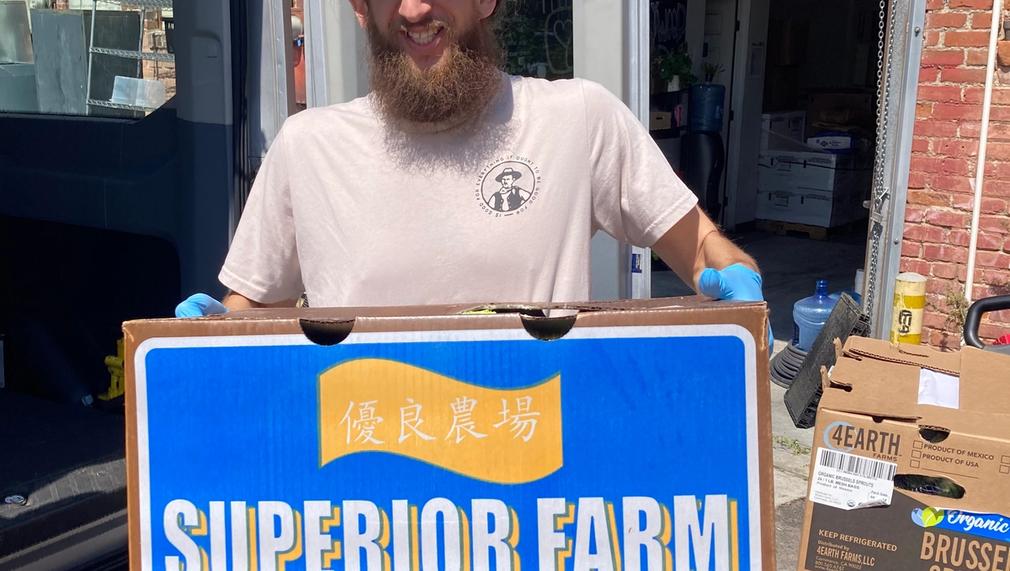Los Angeles Food Hub
‘LA Food Hub’ - Hollywood Food Coalition (HoFoCo), Asian Pacific Islander Forward Movement (APIFM), Farm2People (F2P), and Polo’s Pantry (PP) - is a collaborative effort to create a more equitable local food system for our dense, urban locale. Our shared resource model leverages each org’s unique assets - from physical to social infrastructure - to source fresh food from independent growers, recover food from local enterprises and distribute culturally relevant food with efficiency and values-driven intention from one central, shared facility.

What is the primary issue area that your application will impact?
Food insecurity and access to basic needs
In what stage of innovation is this project, program, or initiative?
Pilot or new project, program, or initiative (testing or implementing a new idea)
What is your understanding of the issue that you are seeking to address?
LA is located amidst the most productive agricultural counties in the nation, but there’s a vast disconnect between local supply and our population. Recent surveys show as many as 1 in 3 Angelenos are food insecure, particularly in low-income, immigrant, and historically underserved communities that concurrently experience higher rates of chronic illness. APIFM learned through its own community surveys that Chinatown, for instance, lost its last full-service grocery store in 2019, requiring residents to now travel over 10 miles to access healthy, culturally relevant and affordable food. Meanwhile, F2P knows that prime, regeneratively grown produce is often available as surplus from local farmers; and HoFoCo’s decades of experience in food recovery demonstrates that food diverted from landfills can dramatically decrease food insecurity. Together, our collaboration addresses systemic and policy-driven gaps in our local food system by bridging supply and demand in community-specific ways.
Describe the project, program, or initiative this grant will support to address the issue.
‘LA Food Hub’ is creating a holistic, urban framework to expand food and nutrition access, and to service local growers, institutional buyers, and other food-focused nonprofits through collaboration. Leveraging our organizations' distinct capacities and strengths, our hub implements solutions at various touchpoints of the local food supply chain to meet the needs of our communities.
Our collaboration is enabled by shared infrastructure. Thanks to the LA City Macro Grant, HoFoCo is currently expanding its warehousing, offering our hub the opportunity to co-locate, share cold storage, equipment and people power. Through a grant from LA2050, we will pilot our first-ever implementation of the Hub model and demonstrate its potential to scale impact through collaborative programming.
We will develop a pipeline of new food sources through our network of relationships, pinpointed to address local community challenges with food access. Historically, food access for these communities has been disrupted by systemic issues, such as neighborhood displacement, income disparity, and housing costs. We will demonstrate the benefit of our collaboration for creating new opportunities for food access and increasing the long-term supply of culturally-relevant food distributions. Practically speaking, we will deliver culturally appropriate foods, sourced from within the LA regional foodshed, to a mix of schools, residents and CBOs and better align our food systems with community member needs.
Describe how Los Angeles County will be different if your work is successful.
We will establish a model for transforming local food systems by building a Food Hub that centers climate resilience, collaboration, cultural-relevance and compassion. If successful, in the short term the work of our four organizations will be sustained and scaled, establishing more effective methods for distributing millions of pounds of additional fresh food within our communities each year. A long term goal would be to share this hub model with other community-based organizations to create a strengthened local food hub network across L.A. County.
Through a network of food hubs, we will see strengthened and new connections between small local, BIPOC farmers and producers, food distributors and recovery organizations, and diverse communities. The movement of food is currently centered around large operators, which prioritize scale over quality and local needs. Through creating a community-owned Hub space, our model would prioritize the needs of culturally diverse communities.
What evidence do you have that this project, program, or initiative is or will be successful, and how will you define and measure success?
1. Pounds of food sourced through farmers and food recovery donors and distributed to the community. F2P will be expanding its network of growers in Southern California, and HoFoCo will be expanding its network of donors in the food recovery system. 2. Pounds of each type of food distributed. This metric will allow us to measure our success in providing culturally appropriate foods requested by each community. 3. Number of food-insecure individuals and families served. We will increase our food distributions to existing partners. APIFM is scaling its relationships with school districts and Polo’s is delivering food to communities of color experiencing food apartheid across LA. HoFoCo is serving seniors, people experiencing homelessness, and immigrant communities among other marginalized groups left out of the food system.
4. A written guide for establishing an operational Food Hub, which can be shared with other communities interested in starting their own.
Describe the role of collaborating organizations on this project.
Farm2People will source food used in this project from their network of food producers and farmers.
HoFoCo will source food from their network of food donors for the project; they will also manage and build-out the shared warehouse space, which will be used to store food as part of this project.
APIFM and PP will solicit input from their communities on types of food needed and will implement the distributions.
Approximately how many people will be impacted by this project, program, or initiative?
Direct Impact: 1,000.0
Indirect Impact: 61,610.0